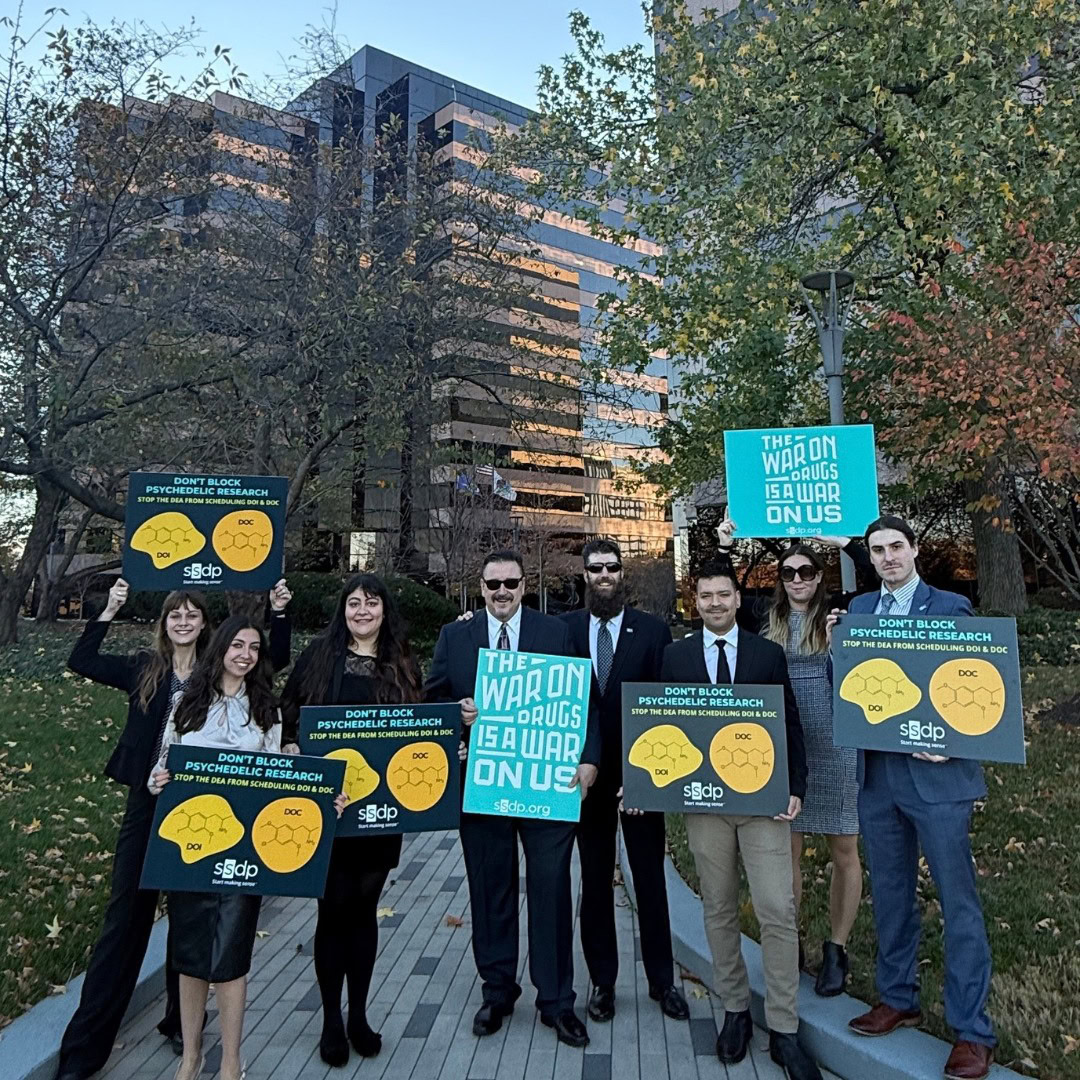
What do students, a billion-dollar federal agency and scientific experts on niche research chemicals have in common? A stake in shaping the future of science, public health and policy — and a desire to protect the American people.
From Nov. 12-19, the team at Students for Sensible Drug Policy (SSDP) were in a legal battle at the Drug Enforcement Administration (DEA) headquarters, defending the scheduling status of lesser-known psychedelic research compounds 2,5-dimethoxy-4-iodoamphetamine (DOI) and 2,5-dimethoxy-4-chloroamphetamine (DOC), cornerstones in neuroscience research.
SSDP, the largest national youth-led network dedicated to ending the War on Drugs, has twice challenged the DEA, including requesting a formal hearing.
“None of us were experts on administrative hearings, we were just a couple of passionate scientists who wanted to make a difference,” says Elijah Ullman, PhD, pharmacologist and co-founder of SSDP’s Science Policy Council, who joined SSDP when he was only a high school student. “Now our group has gone up in front of the federal government and made our voices heard.”

Read Boulder Weekly’s story about the proposed ban.
DOI and DOC’s status as unscheduled compounds has made them de facto tools for researchers studying serotonin 5-HT2A receptors (which are activated by commonly used psychedelics) and its roles in pain management, combatting depression and preventing drug addiction.
These chemicals remain largely unpopular as recreational drugs since they produce a 20-30 hour effect duration and, according to some researchers, produce an “unpleasant” high.
SSDP and the government agreed there is no evidence of physiological or psychic dependence or documentation of human use in medical literature. But federal officials in favor of scheduling say they are ultimately concerned about a general rise in phenethylamine use.
When Dr. Theresa Carbonaro, the DEA expert witness and pharmacologist, was asked if drug use equates to abuse, she stated “Yes” and that any reports of DOI outside of a controlled, clinical setting are evidence of abuse and trafficking — “reports” here meaning anonymous posts on online drug use forums and Reddit comments.
The government’s primary arguments for scheduling DOI and DOC is that they lack any approved medical use and are not sought in Food and Drug Administration (FDA) applications, thereby failing to meet criteria for accepted therapeutic utility. The DEA further argues that because DOI and DOC are similar to other Schedule I drugs, they should be as well.
This groundbreaking DOI and DOC case is the first hearing of its kind since the scheduling of MDMA (commonly known as “molly” or “ecstasy”) in 1985, as well as the first time “research harm evidence” has been formally considered in a DEA scheduling case.
Placement into Schedule I would create major regulatory and financial barriers that could delay crucial research by months or years. Psychedelic regulation by the DEA has kept people out of the field for over 50 years.
Spanning across three full days, SSDP testimony included nearly a dozen scientific expert witnesses who argued against the scheduling, highlighting how criminalization exacerbates social inequities and public health challenges. This case, and the others that stood before, highlights the need for greater discernment and thorough evaluation of evidence in drug scheduling decisions, with a focus on their long-term societal implications.
When Dr. David Nichols, pharmacologist and the world’s leading expert on DOI, took the stand, he recounted how his son Charles realized the substance is one of the world’s most powerful anti-inflammatory agents, more so than steroids and nonsteroidal anti-inflammatory drugs — a discovery that would not have been made if DOI was scheduled.
A scheduling recommendation from DEA Administrative Law Judge Paul E. Soeffing will follow a review of the courtroom transcripts and submission of the post-hearing briefs. This process is estimated to take several months, but SSDP remains steadfast in its mission to advocate for evidence-based drug policies and protect the freedom of scientific inquiry.
Gina Giorgio is the Director of Strategy and Development at Students for Sensible Drug Policy. She is a tea aficionado, avid pilates practitioner and psychedelic media enthusiast.
This opinion does not necessarily represent the views of Boulder Weekly.
